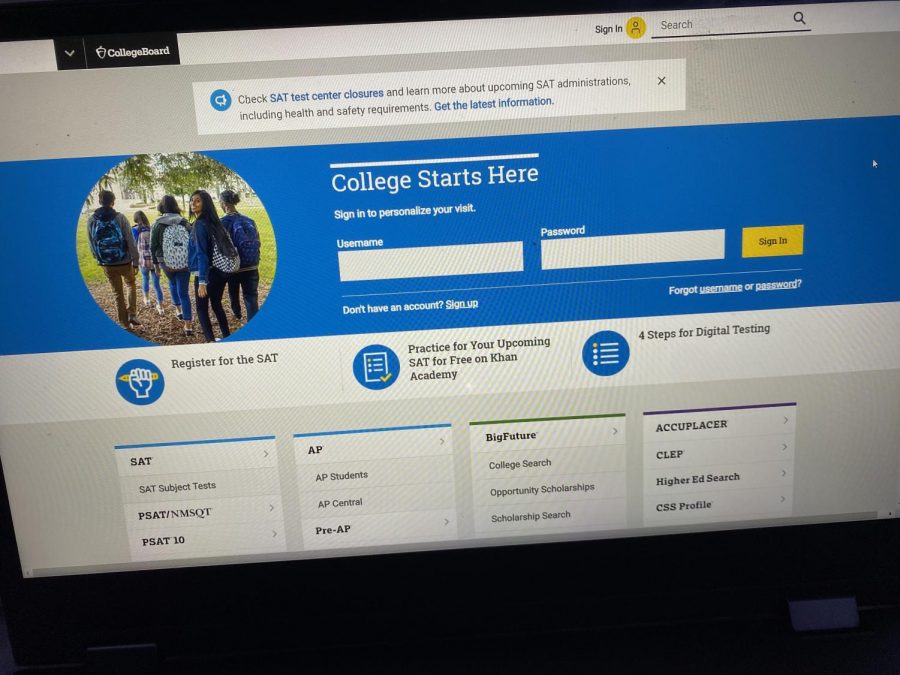Digital AP Exams: Beneficial or Detrimental?
The upcoming 2021 AP Exams will be administered at Cam High in school on paper and pencil, as well as in school and at home for digital testing. Digital testing comes with a guide encompassing the digital exam experience and its requirements, accommodations, policies, and procedures.
The AP Central website lays out digital testing requirements, including the need for all students to have access a laptop or desktop computer, specifying all these models to be okay: “(Mac, Windows, or school-managed Chromebooks).” Cam High is requiring that students solely use school-managed chromebooks, which poses some questions.
Jeff Jackson, an AP teacher and a technology coach at Cam High who actively helps teachers and staff with technology related issues, believes that though taking the test digitally may be tempting, it may not be the best option for everyone: “I think the in person test is the best option, as you have the paper and all pages there to flip through. You also get the opportunity to go back and correct answers on the in person exam, not so on the at home versions; I feel many will be leaving points on the table. Could that be the point that earned you a college credit?” He noted that the paper and pencil option was most recommended to his students, but many of them did not listen.
A senior at Cam High, Jack Cadenhead, has his own concerns for the Digital Format. Although he is aware of the difficulties that creating an all-encompassing exam bring forth, Cadenhead notes that, “ The primary issue that seems to be the target of much criticism is that of an inability to move backwards through an exam once you’ve submitted an answer. We’ve built (and will continue to build) our test-taking experience around a traditional test-taking style in which students have the ability to manage their time by skipping or guessing on questions. To have this ability removed is to throw the entire concept of time management out the window; we can no longer spend more time on difficult questions and less time on easier questions, which is going to lead to an absurd amount of pressure on the students in addition to a new testing environment altogether. I understand College Board’s concerns for the ability to cheat through moving backwards in a test, but they also disregarded the notion that all testing in education thus far has been built upon the foundation of time management.”
Cam High suggested an order to enforce students use school issued chromebooks for testing and the College board stated that personal chromebooks are not being supported for the AP test. Jackson advises using the chromebooks for AP testing, as, “the browsers are installed by the district in advance. In addition, tech support from the district is sure to be more speedy, as they are familiar with the devices, whereas students’ home devices offer up a variety of settings and softwares to work through.”
Cadenhead feels that although he understands the reasons for which they enacted this order, it only adds to the inconvenience of testing: “Chromebooks are notoriously difficult to work with, and extremely unpopular with most student populations, especially considering their rather slow processing times, small screen, and being prone to freezing, locking up, or crashing entirely. I would like to note, however, that I’m not entirely against the use of chromebooks for testing, as opposed to personal devices. Those whose homelife and socioeconomic conditions won’t allow for personal devices to be used, chromebooks are a great alternative.”
Jackson, though having his own opinions regarding how the AP tests are being held for the 2020-2021 school year, believes that though College Board could have handled the circumstances differently, its opinions were incredibly limited: “Honestly, I don’t see what else we could do differently. Our current situation and setting throws several variables into the equation: hybrid schedules, at home only students/teachers, variable testing dates (in person/digital), differing devices. I think if we would have dictated one testing date, say the first in-person test, things would have been much more streamlined. Unfortunately, to keep it fair for everyone, we make it more complex for everyone. It’s not a lack of transparency, as I, and probably all the other AP teachers, were emailed the new Readiness Dashboard just today. The College Board is doing things differently, and for the first time, so they are operating with a moving target of sorts.”
Cadenhead agreed, adding, “To the best of my knowledge, our school is fairly transparent with any information they receive from College Board, or any other sources, and I have respect for that. It’s somewhat ironic to comment on the transparency of information I’m receiving, because, for all I know, they may not be entirely transparent, [they] but have hidden it well. Nonetheless, I do greatly appreciate the information they’ve provided. It’s helped a lot of us in recent times considering how quickly information is changing right now. My only thought as to a different Digital Testing approach would be to allow the use of personal computers or devices, instead of chromebooks for the reasons aforementioned. I know not how difficult it is to allow this for students, and I understand if they cannot allow it, but I would appreciate it if they cited reasons as to why it cannot be allowed (assuming they haven’t already–I may have missed that information had it already been released).”
Teachers and administrators are working to the best of their ability to aid students in the 2021 exams. Digital exams have not been fully flushed out, but as for this year, it seems as though their format has been fully established. With ongoing transparency, a more positive outlook could be issued to the College Board which has an increasing profit of $58,592,473 according to Total Registration in their most recent 2019 audit of the not-for-profit company. With a 10% increase in AP exam cost over the past ten years, it is imperative that everyone use their voice to discuss concerns.
A change.org petition with 118,000+ signatures pleads the College Board be more fair with their deadlines and fees concerning the AP exams. It requests that College Board, “[not] move the AP exam registration deadline to November. It should stay in March, Not to add new $40 late fees and $40 cancellation fees, Not to force students to provide their personal data to the College Board, regardless if they are taking the AP exam or not, The 118,000+ petition signers are expecting a public response on the College Board’s website by May 15, 2019.” As of the 2020-21 school year, the College Board’s registration deadline states that the on time exam order fee is issued, “by November 13, 2020, for full-year and first-semester courses; by March 12, 2021, for courses that start after November 13.” There continues to be a $40 dollar late fee, but the cancellation fee is not applicable in 2021. The AP College board continues to collect data as they are, “available online for all years beginning with the 1997 AP Exam administration. These reports contain information about participation in the AP Program, performance on individual exams, changes in exam volume and much more. Beginning with the 2002 exam administration, the amount of data and type of reports published increased considerably, providing even greater insight into the students and schools that participate in the AP Program.”
Transparency, accountability, and communication is imperative when discussing a company that intakes high numbers of “profit”, investments, and data. It is safe to say digital testing very well may be the future for AP tests, as long as these tests continue to be profitable–a factor that can only be determined by the people’s’ response.

Hi, my name is Garrett. What's your favorite book? OMG that's my favorite too!

















































































![Senior Ditch Day... Relaxation or Truancy? [Video]](https://achsstinger.com/wp-content/uploads/2017/10/IMG_7119-900x599.jpg)
![Heavy Rain Hits Cam High [video]](https://achsstinger.com/wp-content/uploads/2017/02/maxresdefault-900x506.jpg)




